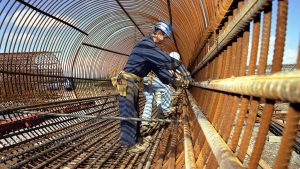The social value of infrastructure is the infrastructure.
Ken Gibson, executive director of the Alberta Construction Association, made that statement during an animated discussion pertaining to community benefits at the Industry Advocacy and Regulatory Affairs Committee meeting held recently during the Canadian Construction Association’s (CCA) 100th annual conference in Banff, Alta.
“I don’t understand how our member firms can be expected to deliver their ‘A’ team for quality infrastructure and innovation if we’re going to layer on requirement after requirement to address social ills,” he said.
The discussion ensued after an update was given on two government initiatives that will impact the construction industry when it comes to the requirement of community benefit.
In the fall of 2017, the CCA and other stakeholders met with Infrastructure Canada to discuss the Community Benefits Framework, a federal government requirement that will be implemented in Phase 2 agreements with the provinces.
The framework will require owners to report on the employment benefits derived through projects, reads a CCA briefing. Women, Indigenous people, new citizens, small businesses and veterans were listed as groups specified.
According to the briefing, the government had set to sign agreements with the provinces this month.
“This framework will be included in the agreements and will only be finalized upon signing of the agreements,” it reads. “It will only require reporting and will not have any targets.”
At this point, the purpose behind the framework is for the government to gather data from projects.
The other initiative mentioned was Bill C-344, An Act to amend the Department of Public Works and Government Services Act (community benefit). This bill aims to give the minister of Public Services and Procurement Canada the authority to require an assessment of the benefits that a community derives from a construction, maintenance or repair project.
According to a CCA report, there is a chance the bill may reach Royal Assent before June.
“However, the Bill only requires projects undertaken by the Federal Government to report on community benefits if asked,” the report reads.
Chris Lorenc, president of the Manitoba Heavy Construction Association, said on the provincial and municipal level, his members are already facing challenges on contracts with these requirements.
“We understand that there will be, and we have said to the government, if you wish to have legacy aspects built into some of the infrastructure projects we understand that but they need to be clear,” he told committee members. “The risk that we run in opening the door too wide, is that we become the bearer to correct everything that everyone identifies is an ill caused by whomever in history. That dilutes then the value of having effectively raised the profile of infrastructure and the purposes for which such programs are intended.”
Gibson stated he too is facing similar problems in Alberta and added federally this is cause for even more concern.
“Why would our member contractors want to serve up data that will ultimately lead to more regulation?” he asked rhetorically. “They’re going to be regulating and saying this is how you need to manage your business folks. We need to be very careful.”
CCA president Mary Van Buren stated the association has been actively discussing community benefits with the federal government and will continue to do so.
“Of course the industry is supportive of community benefits, being good corporate social citizens,” she said to the committee. “However, we did have some concerns on where this might go. Reporting is one thing, but then if it becomes written into bids etc. that has to be very clear on what it is they want. Even around the reporting, they still have some work to do around what that is.
“If you’re (the industry) going to be reporting on this, you need to have enough time to set up whatever that reporting process is. We will certainly keep on that, seeking more definition, more clarity.”
Lorenc added while the industry isn’t against community and employment benefits, it shouldn’t completely fall on construction.
“It’s so easy to pick on this industry as the bearer of solutions to problems,” he said.
“There’s a point beyond which it becomes unacceptable and that’s the real worry we have.”











Recent Comments
comments for this post are closed